Reflective Learning: Feedback and Success in Higher Education
VerifiedAdded on 2023/06/11
|7
|1847
|73
Essay
AI Summary
This essay explores the concept of reflective learning in higher education, emphasizing its role in academic success. It delves into the importance of feedback and feed-forward mechanisms, utilizing Gibbs' reflective cycle as a framework for analysis. The essay highlights how reflective practices enable learners to assess their skills, knowledge, and experiences, fostering self-awareness and confidence. It further elaborates on the significance of feedback from experts and feed-forward strategies in enhancing performance on formative and summative assignments. By understanding both strengths and weaknesses, students can improve their learning approaches, develop effective action plans, and achieve their academic and professional goals. Desklib offers a platform for students to access similar solved assignments and past papers.
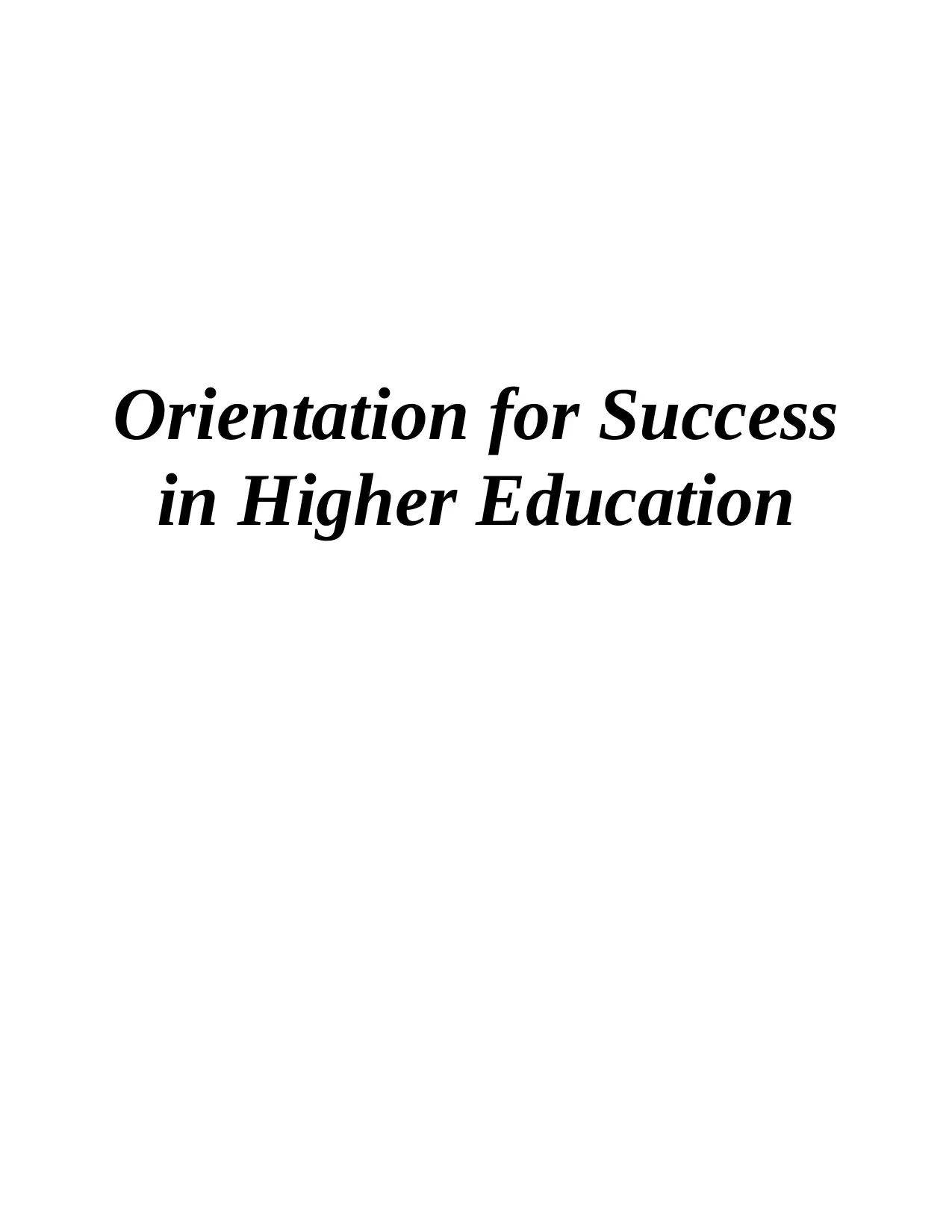
Orientation for Success
in Higher Education
in Higher Education
Paraphrase This Document
Need a fresh take? Get an instant paraphrase of this document with our AI Paraphraser
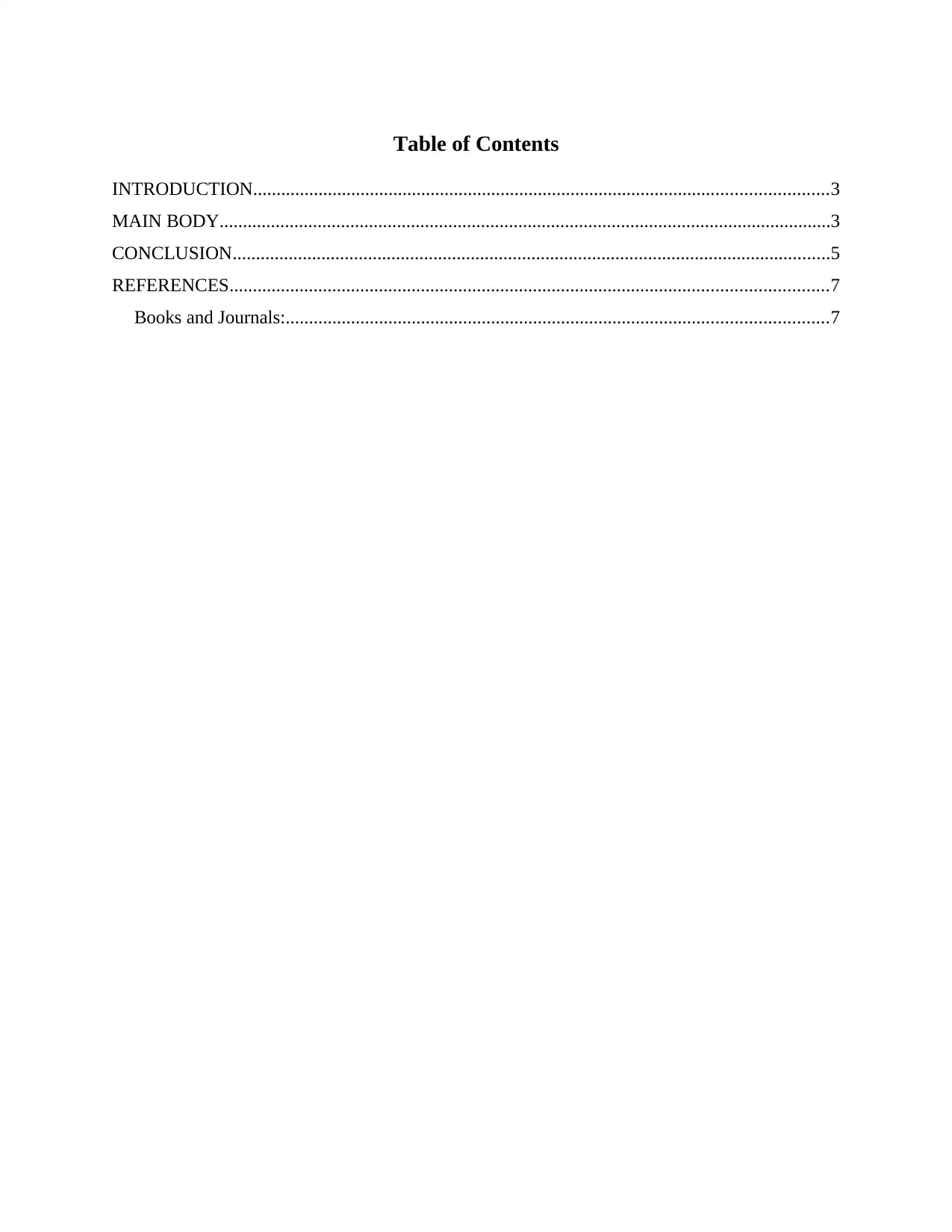
Table of Contents
INTRODUCTION...........................................................................................................................3
MAIN BODY...................................................................................................................................3
CONCLUSION................................................................................................................................5
REFERENCES................................................................................................................................7
Books and Journals:....................................................................................................................7
INTRODUCTION...........................................................................................................................3
MAIN BODY...................................................................................................................................3
CONCLUSION................................................................................................................................5
REFERENCES................................................................................................................................7
Books and Journals:....................................................................................................................7
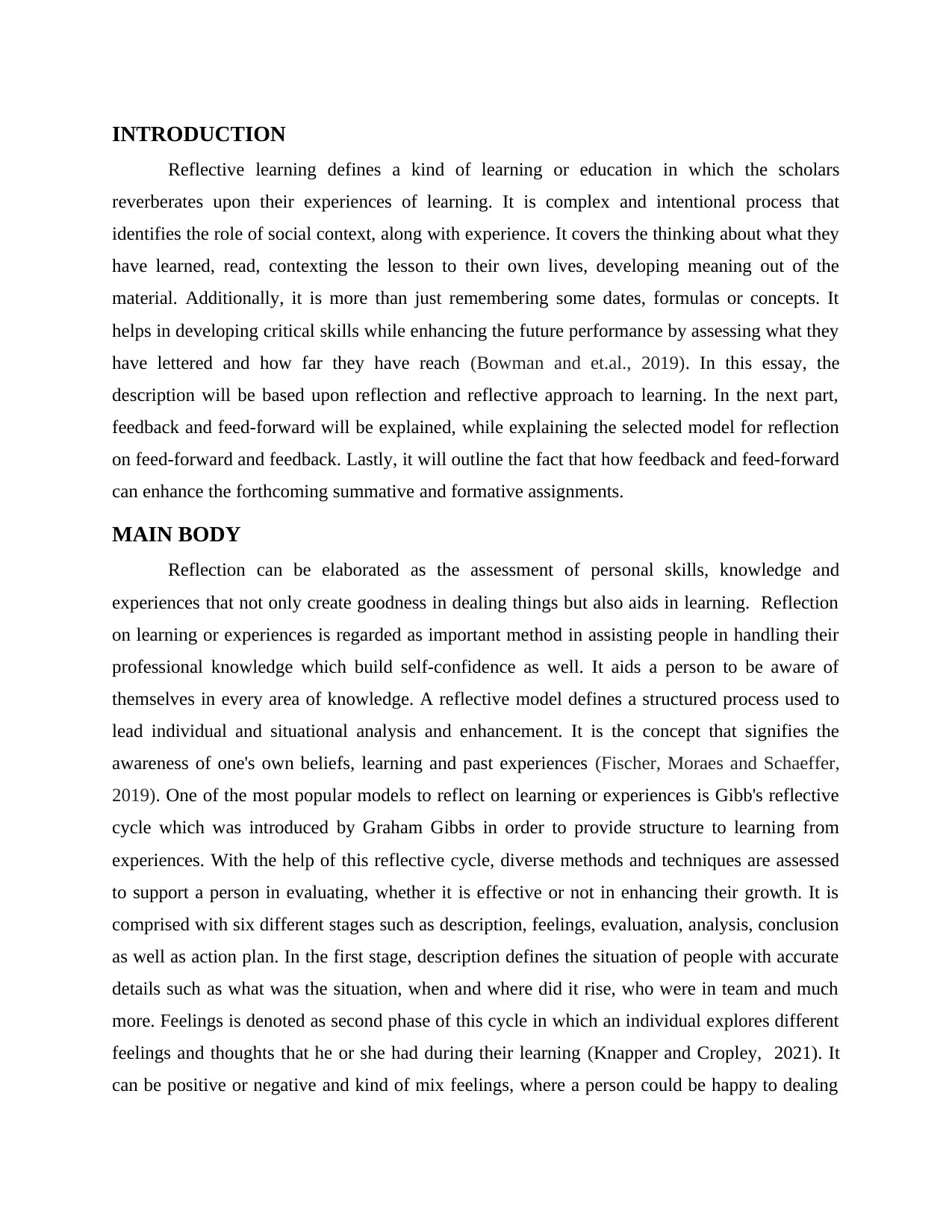
INTRODUCTION
Reflective learning defines a kind of learning or education in which the scholars
reverberates upon their experiences of learning. It is complex and intentional process that
identifies the role of social context, along with experience. It covers the thinking about what they
have learned, read, contexting the lesson to their own lives, developing meaning out of the
material. Additionally, it is more than just remembering some dates, formulas or concepts. It
helps in developing critical skills while enhancing the future performance by assessing what they
have lettered and how far they have reach (Bowman and et.al., 2019). In this essay, the
description will be based upon reflection and reflective approach to learning. In the next part,
feedback and feed-forward will be explained, while explaining the selected model for reflection
on feed-forward and feedback. Lastly, it will outline the fact that how feedback and feed-forward
can enhance the forthcoming summative and formative assignments.
MAIN BODY
Reflection can be elaborated as the assessment of personal skills, knowledge and
experiences that not only create goodness in dealing things but also aids in learning. Reflection
on learning or experiences is regarded as important method in assisting people in handling their
professional knowledge which build self-confidence as well. It aids a person to be aware of
themselves in every area of knowledge. A reflective model defines a structured process used to
lead individual and situational analysis and enhancement. It is the concept that signifies the
awareness of one's own beliefs, learning and past experiences (Fischer, Moraes and Schaeffer,
2019). One of the most popular models to reflect on learning or experiences is Gibb's reflective
cycle which was introduced by Graham Gibbs in order to provide structure to learning from
experiences. With the help of this reflective cycle, diverse methods and techniques are assessed
to support a person in evaluating, whether it is effective or not in enhancing their growth. It is
comprised with six different stages such as description, feelings, evaluation, analysis, conclusion
as well as action plan. In the first stage, description defines the situation of people with accurate
details such as what was the situation, when and where did it rise, who were in team and much
more. Feelings is denoted as second phase of this cycle in which an individual explores different
feelings and thoughts that he or she had during their learning (Knapper and Cropley, 2021). It
can be positive or negative and kind of mix feelings, where a person could be happy to dealing
Reflective learning defines a kind of learning or education in which the scholars
reverberates upon their experiences of learning. It is complex and intentional process that
identifies the role of social context, along with experience. It covers the thinking about what they
have learned, read, contexting the lesson to their own lives, developing meaning out of the
material. Additionally, it is more than just remembering some dates, formulas or concepts. It
helps in developing critical skills while enhancing the future performance by assessing what they
have lettered and how far they have reach (Bowman and et.al., 2019). In this essay, the
description will be based upon reflection and reflective approach to learning. In the next part,
feedback and feed-forward will be explained, while explaining the selected model for reflection
on feed-forward and feedback. Lastly, it will outline the fact that how feedback and feed-forward
can enhance the forthcoming summative and formative assignments.
MAIN BODY
Reflection can be elaborated as the assessment of personal skills, knowledge and
experiences that not only create goodness in dealing things but also aids in learning. Reflection
on learning or experiences is regarded as important method in assisting people in handling their
professional knowledge which build self-confidence as well. It aids a person to be aware of
themselves in every area of knowledge. A reflective model defines a structured process used to
lead individual and situational analysis and enhancement. It is the concept that signifies the
awareness of one's own beliefs, learning and past experiences (Fischer, Moraes and Schaeffer,
2019). One of the most popular models to reflect on learning or experiences is Gibb's reflective
cycle which was introduced by Graham Gibbs in order to provide structure to learning from
experiences. With the help of this reflective cycle, diverse methods and techniques are assessed
to support a person in evaluating, whether it is effective or not in enhancing their growth. It is
comprised with six different stages such as description, feelings, evaluation, analysis, conclusion
as well as action plan. In the first stage, description defines the situation of people with accurate
details such as what was the situation, when and where did it rise, who were in team and much
more. Feelings is denoted as second phase of this cycle in which an individual explores different
feelings and thoughts that he or she had during their learning (Knapper and Cropley, 2021). It
can be positive or negative and kind of mix feelings, where a person could be happy to dealing
⊘ This is a preview!⊘
Do you want full access?
Subscribe today to unlock all pages.

Trusted by 1+ million students worldwide
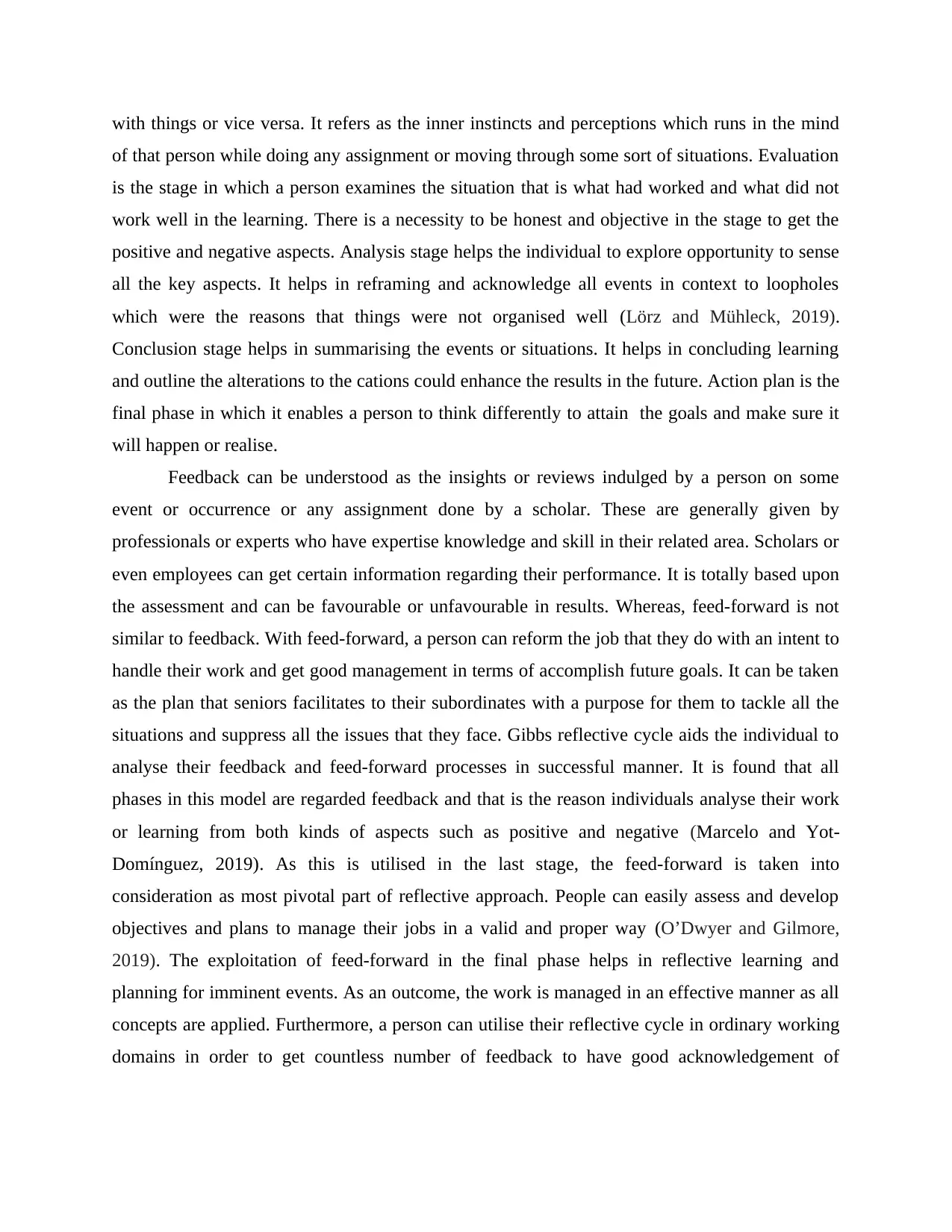
with things or vice versa. It refers as the inner instincts and perceptions which runs in the mind
of that person while doing any assignment or moving through some sort of situations. Evaluation
is the stage in which a person examines the situation that is what had worked and what did not
work well in the learning. There is a necessity to be honest and objective in the stage to get the
positive and negative aspects. Analysis stage helps the individual to explore opportunity to sense
all the key aspects. It helps in reframing and acknowledge all events in context to loopholes
which were the reasons that things were not organised well (Lörz and Mühleck, 2019).
Conclusion stage helps in summarising the events or situations. It helps in concluding learning
and outline the alterations to the cations could enhance the results in the future. Action plan is the
final phase in which it enables a person to think differently to attain the goals and make sure it
will happen or realise.
Feedback can be understood as the insights or reviews indulged by a person on some
event or occurrence or any assignment done by a scholar. These are generally given by
professionals or experts who have expertise knowledge and skill in their related area. Scholars or
even employees can get certain information regarding their performance. It is totally based upon
the assessment and can be favourable or unfavourable in results. Whereas, feed-forward is not
similar to feedback. With feed-forward, a person can reform the job that they do with an intent to
handle their work and get good management in terms of accomplish future goals. It can be taken
as the plan that seniors facilitates to their subordinates with a purpose for them to tackle all the
situations and suppress all the issues that they face. Gibbs reflective cycle aids the individual to
analyse their feedback and feed-forward processes in successful manner. It is found that all
phases in this model are regarded feedback and that is the reason individuals analyse their work
or learning from both kinds of aspects such as positive and negative (Marcelo and Yot-
Domínguez, 2019). As this is utilised in the last stage, the feed-forward is taken into
consideration as most pivotal part of reflective approach. People can easily assess and develop
objectives and plans to manage their jobs in a valid and proper way (O’Dwyer and Gilmore,
2019). The exploitation of feed-forward in the final phase helps in reflective learning and
planning for imminent events. As an outcome, the work is managed in an effective manner as all
concepts are applied. Furthermore, a person can utilise their reflective cycle in ordinary working
domains in order to get countless number of feedback to have good acknowledgement of
of that person while doing any assignment or moving through some sort of situations. Evaluation
is the stage in which a person examines the situation that is what had worked and what did not
work well in the learning. There is a necessity to be honest and objective in the stage to get the
positive and negative aspects. Analysis stage helps the individual to explore opportunity to sense
all the key aspects. It helps in reframing and acknowledge all events in context to loopholes
which were the reasons that things were not organised well (Lörz and Mühleck, 2019).
Conclusion stage helps in summarising the events or situations. It helps in concluding learning
and outline the alterations to the cations could enhance the results in the future. Action plan is the
final phase in which it enables a person to think differently to attain the goals and make sure it
will happen or realise.
Feedback can be understood as the insights or reviews indulged by a person on some
event or occurrence or any assignment done by a scholar. These are generally given by
professionals or experts who have expertise knowledge and skill in their related area. Scholars or
even employees can get certain information regarding their performance. It is totally based upon
the assessment and can be favourable or unfavourable in results. Whereas, feed-forward is not
similar to feedback. With feed-forward, a person can reform the job that they do with an intent to
handle their work and get good management in terms of accomplish future goals. It can be taken
as the plan that seniors facilitates to their subordinates with a purpose for them to tackle all the
situations and suppress all the issues that they face. Gibbs reflective cycle aids the individual to
analyse their feedback and feed-forward processes in successful manner. It is found that all
phases in this model are regarded feedback and that is the reason individuals analyse their work
or learning from both kinds of aspects such as positive and negative (Marcelo and Yot-
Domínguez, 2019). As this is utilised in the last stage, the feed-forward is taken into
consideration as most pivotal part of reflective approach. People can easily assess and develop
objectives and plans to manage their jobs in a valid and proper way (O’Dwyer and Gilmore,
2019). The exploitation of feed-forward in the final phase helps in reflective learning and
planning for imminent events. As an outcome, the work is managed in an effective manner as all
concepts are applied. Furthermore, a person can utilise their reflective cycle in ordinary working
domains in order to get countless number of feedback to have good acknowledgement of
Paraphrase This Document
Need a fresh take? Get an instant paraphrase of this document with our AI Paraphraser
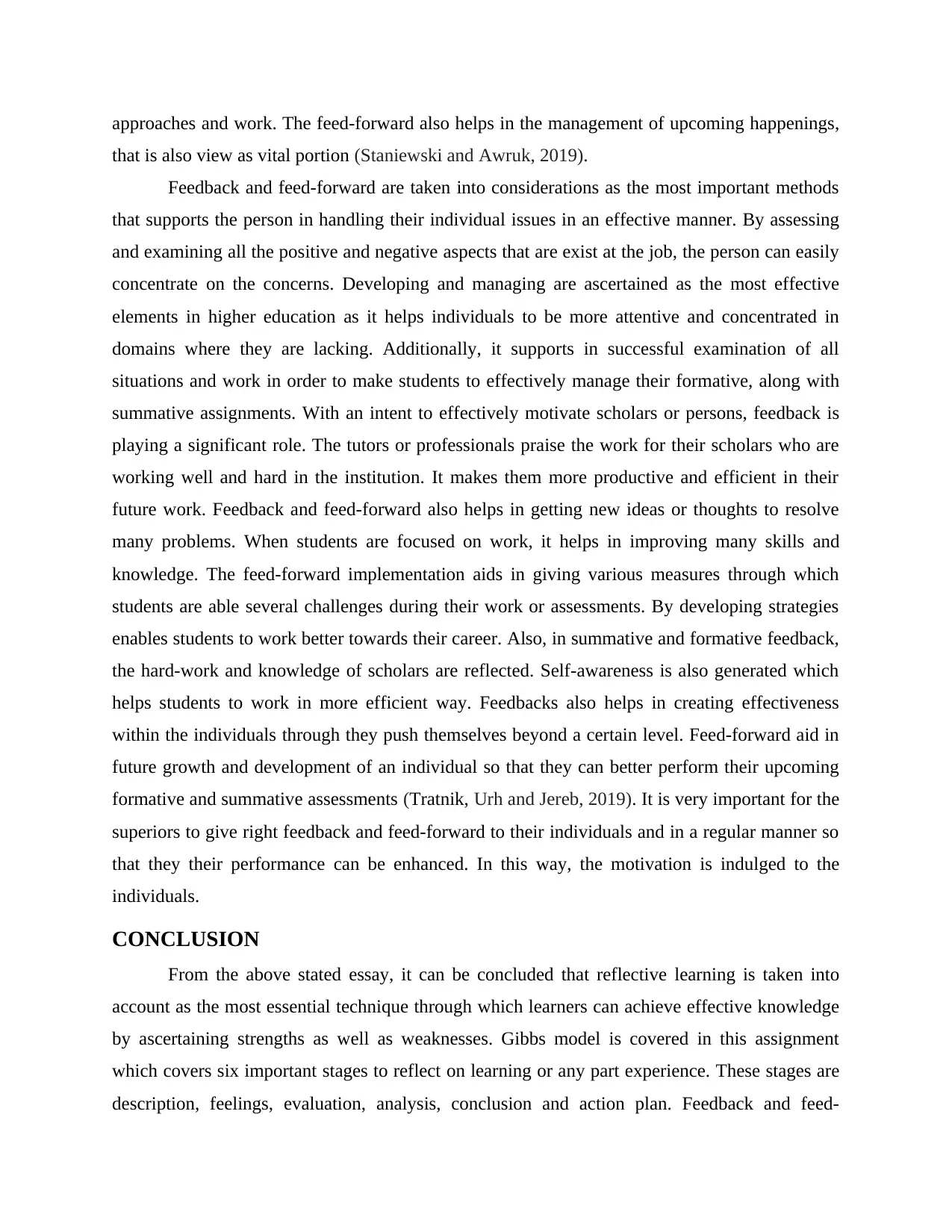
approaches and work. The feed-forward also helps in the management of upcoming happenings,
that is also view as vital portion (Staniewski and Awruk, 2019).
Feedback and feed-forward are taken into considerations as the most important methods
that supports the person in handling their individual issues in an effective manner. By assessing
and examining all the positive and negative aspects that are exist at the job, the person can easily
concentrate on the concerns. Developing and managing are ascertained as the most effective
elements in higher education as it helps individuals to be more attentive and concentrated in
domains where they are lacking. Additionally, it supports in successful examination of all
situations and work in order to make students to effectively manage their formative, along with
summative assignments. With an intent to effectively motivate scholars or persons, feedback is
playing a significant role. The tutors or professionals praise the work for their scholars who are
working well and hard in the institution. It makes them more productive and efficient in their
future work. Feedback and feed-forward also helps in getting new ideas or thoughts to resolve
many problems. When students are focused on work, it helps in improving many skills and
knowledge. The feed-forward implementation aids in giving various measures through which
students are able several challenges during their work or assessments. By developing strategies
enables students to work better towards their career. Also, in summative and formative feedback,
the hard-work and knowledge of scholars are reflected. Self-awareness is also generated which
helps students to work in more efficient way. Feedbacks also helps in creating effectiveness
within the individuals through they push themselves beyond a certain level. Feed-forward aid in
future growth and development of an individual so that they can better perform their upcoming
formative and summative assessments (Tratnik, Urh and Jereb, 2019). It is very important for the
superiors to give right feedback and feed-forward to their individuals and in a regular manner so
that they their performance can be enhanced. In this way, the motivation is indulged to the
individuals.
CONCLUSION
From the above stated essay, it can be concluded that reflective learning is taken into
account as the most essential technique through which learners can achieve effective knowledge
by ascertaining strengths as well as weaknesses. Gibbs model is covered in this assignment
which covers six important stages to reflect on learning or any part experience. These stages are
description, feelings, evaluation, analysis, conclusion and action plan. Feedback and feed-
that is also view as vital portion (Staniewski and Awruk, 2019).
Feedback and feed-forward are taken into considerations as the most important methods
that supports the person in handling their individual issues in an effective manner. By assessing
and examining all the positive and negative aspects that are exist at the job, the person can easily
concentrate on the concerns. Developing and managing are ascertained as the most effective
elements in higher education as it helps individuals to be more attentive and concentrated in
domains where they are lacking. Additionally, it supports in successful examination of all
situations and work in order to make students to effectively manage their formative, along with
summative assignments. With an intent to effectively motivate scholars or persons, feedback is
playing a significant role. The tutors or professionals praise the work for their scholars who are
working well and hard in the institution. It makes them more productive and efficient in their
future work. Feedback and feed-forward also helps in getting new ideas or thoughts to resolve
many problems. When students are focused on work, it helps in improving many skills and
knowledge. The feed-forward implementation aids in giving various measures through which
students are able several challenges during their work or assessments. By developing strategies
enables students to work better towards their career. Also, in summative and formative feedback,
the hard-work and knowledge of scholars are reflected. Self-awareness is also generated which
helps students to work in more efficient way. Feedbacks also helps in creating effectiveness
within the individuals through they push themselves beyond a certain level. Feed-forward aid in
future growth and development of an individual so that they can better perform their upcoming
formative and summative assessments (Tratnik, Urh and Jereb, 2019). It is very important for the
superiors to give right feedback and feed-forward to their individuals and in a regular manner so
that they their performance can be enhanced. In this way, the motivation is indulged to the
individuals.
CONCLUSION
From the above stated essay, it can be concluded that reflective learning is taken into
account as the most essential technique through which learners can achieve effective knowledge
by ascertaining strengths as well as weaknesses. Gibbs model is covered in this assignment
which covers six important stages to reflect on learning or any part experience. These stages are
description, feelings, evaluation, analysis, conclusion and action plan. Feedback and feed-
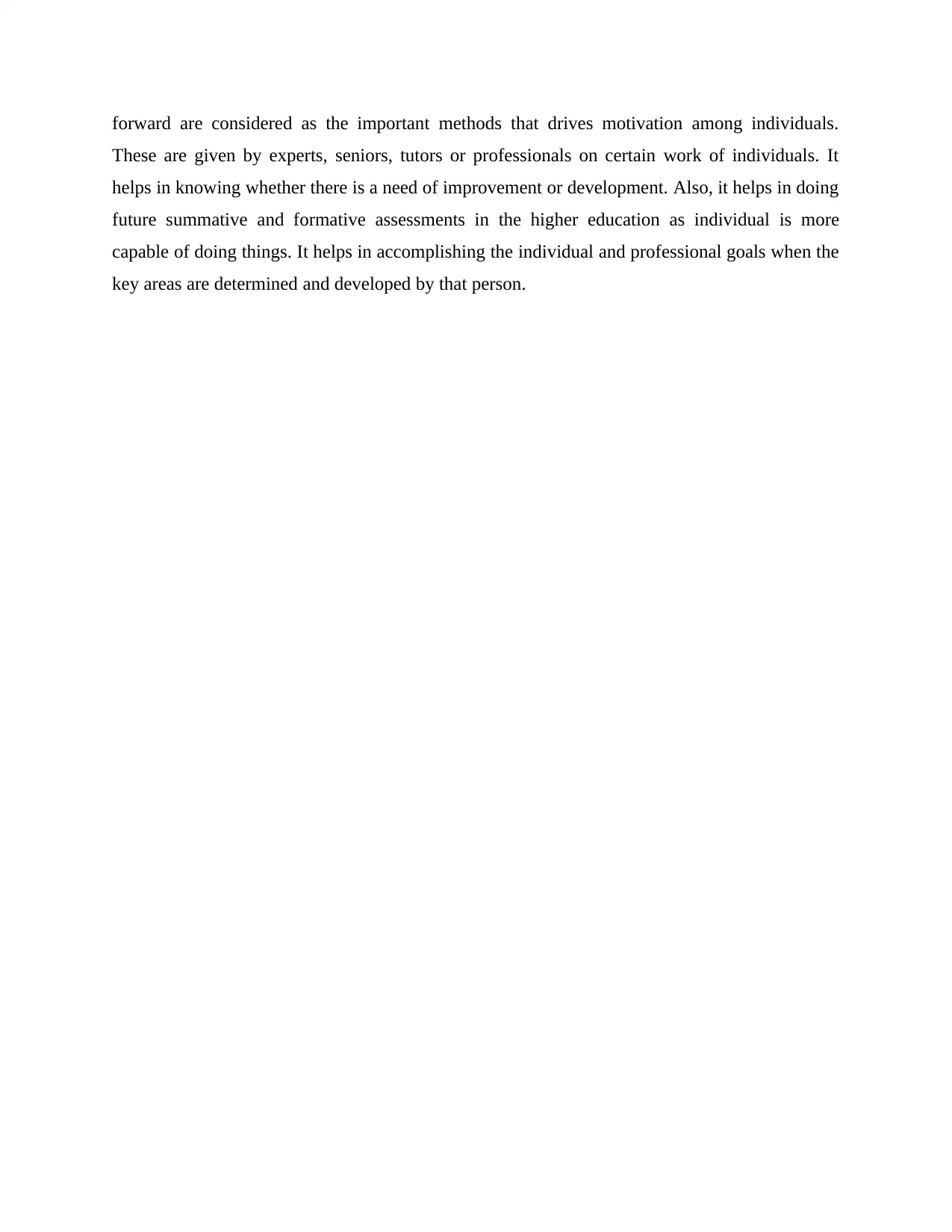
forward are considered as the important methods that drives motivation among individuals.
These are given by experts, seniors, tutors or professionals on certain work of individuals. It
helps in knowing whether there is a need of improvement or development. Also, it helps in doing
future summative and formative assessments in the higher education as individual is more
capable of doing things. It helps in accomplishing the individual and professional goals when the
key areas are determined and developed by that person.
These are given by experts, seniors, tutors or professionals on certain work of individuals. It
helps in knowing whether there is a need of improvement or development. Also, it helps in doing
future summative and formative assessments in the higher education as individual is more
capable of doing things. It helps in accomplishing the individual and professional goals when the
key areas are determined and developed by that person.
⊘ This is a preview!⊘
Do you want full access?
Subscribe today to unlock all pages.

Trusted by 1+ million students worldwide
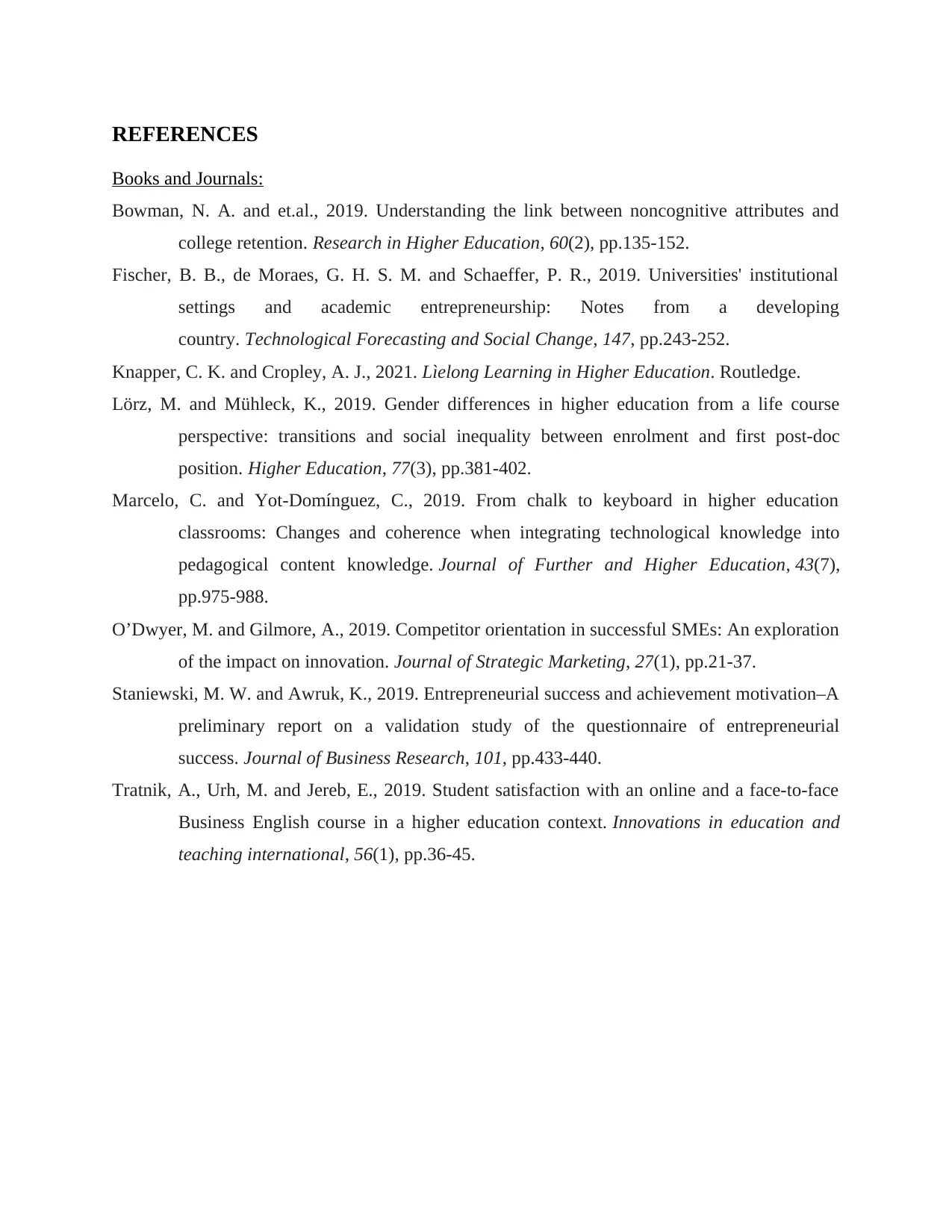
REFERENCES
Books and Journals:
Bowman, N. A. and et.al., 2019. Understanding the link between noncognitive attributes and
college retention. Research in Higher Education, 60(2), pp.135-152.
Fischer, B. B., de Moraes, G. H. S. M. and Schaeffer, P. R., 2019. Universities' institutional
settings and academic entrepreneurship: Notes from a developing
country. Technological Forecasting and Social Change, 147, pp.243-252.
Knapper, C. K. and Cropley, A. J., 2021. Lìelong Learning in Higher Education. Routledge.
Lörz, M. and Mühleck, K., 2019. Gender differences in higher education from a life course
perspective: transitions and social inequality between enrolment and first post-doc
position. Higher Education, 77(3), pp.381-402.
Marcelo, C. and Yot-Domínguez, C., 2019. From chalk to keyboard in higher education
classrooms: Changes and coherence when integrating technological knowledge into
pedagogical content knowledge. Journal of Further and Higher Education, 43(7),
pp.975-988.
O’Dwyer, M. and Gilmore, A., 2019. Competitor orientation in successful SMEs: An exploration
of the impact on innovation. Journal of Strategic Marketing, 27(1), pp.21-37.
Staniewski, M. W. and Awruk, K., 2019. Entrepreneurial success and achievement motivation–A
preliminary report on a validation study of the questionnaire of entrepreneurial
success. Journal of Business Research, 101, pp.433-440.
Tratnik, A., Urh, M. and Jereb, E., 2019. Student satisfaction with an online and a face-to-face
Business English course in a higher education context. Innovations in education and
teaching international, 56(1), pp.36-45.
Books and Journals:
Bowman, N. A. and et.al., 2019. Understanding the link between noncognitive attributes and
college retention. Research in Higher Education, 60(2), pp.135-152.
Fischer, B. B., de Moraes, G. H. S. M. and Schaeffer, P. R., 2019. Universities' institutional
settings and academic entrepreneurship: Notes from a developing
country. Technological Forecasting and Social Change, 147, pp.243-252.
Knapper, C. K. and Cropley, A. J., 2021. Lìelong Learning in Higher Education. Routledge.
Lörz, M. and Mühleck, K., 2019. Gender differences in higher education from a life course
perspective: transitions and social inequality between enrolment and first post-doc
position. Higher Education, 77(3), pp.381-402.
Marcelo, C. and Yot-Domínguez, C., 2019. From chalk to keyboard in higher education
classrooms: Changes and coherence when integrating technological knowledge into
pedagogical content knowledge. Journal of Further and Higher Education, 43(7),
pp.975-988.
O’Dwyer, M. and Gilmore, A., 2019. Competitor orientation in successful SMEs: An exploration
of the impact on innovation. Journal of Strategic Marketing, 27(1), pp.21-37.
Staniewski, M. W. and Awruk, K., 2019. Entrepreneurial success and achievement motivation–A
preliminary report on a validation study of the questionnaire of entrepreneurial
success. Journal of Business Research, 101, pp.433-440.
Tratnik, A., Urh, M. and Jereb, E., 2019. Student satisfaction with an online and a face-to-face
Business English course in a higher education context. Innovations in education and
teaching international, 56(1), pp.36-45.
1 out of 7
Related Documents
Your All-in-One AI-Powered Toolkit for Academic Success.
+13062052269
info@desklib.com
Available 24*7 on WhatsApp / Email
![[object Object]](/_next/static/media/star-bottom.7253800d.svg)
Unlock your academic potential
Copyright © 2020–2026 A2Z Services. All Rights Reserved. Developed and managed by ZUCOL.


